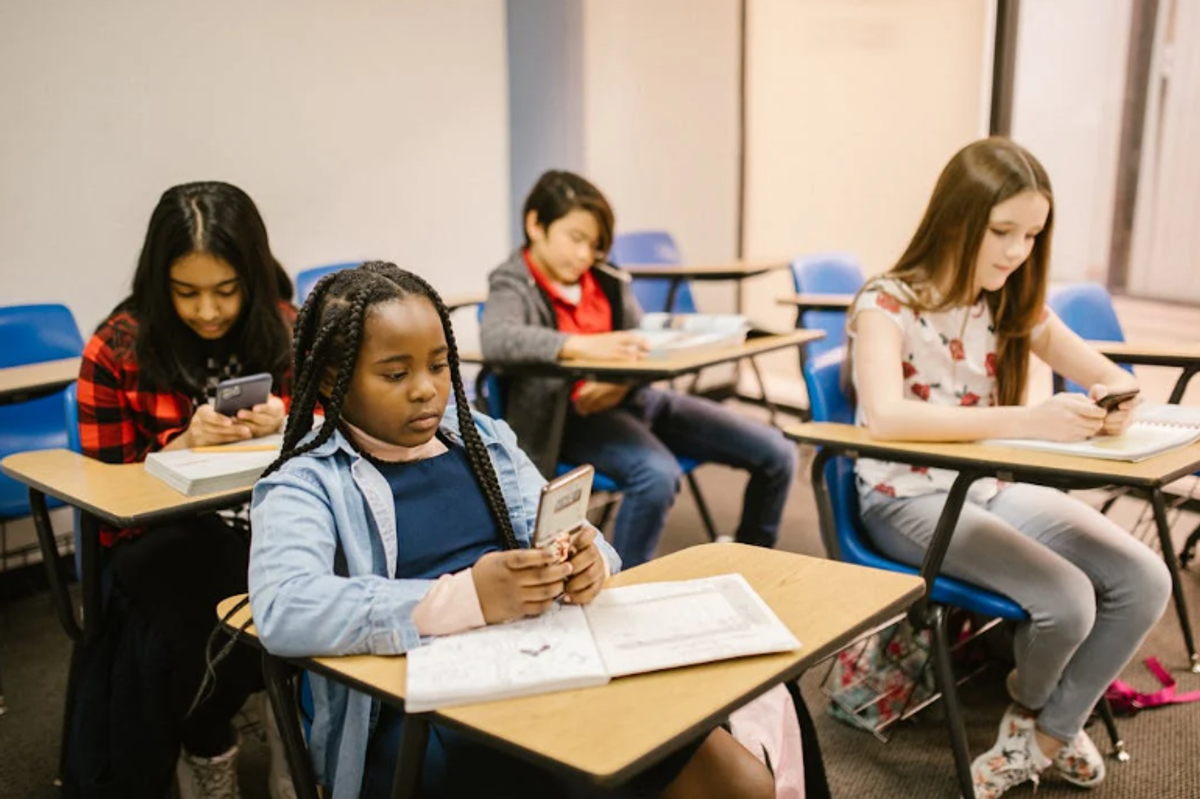Away for a Day is making schools smartphone-free to improve grades and mental health
We should value academics and mental health more than technology.

A classroom of kids staring at their phones.
We have reached a tipping point where people are beginning to realize that the great social experiment of giving smartphones to children and teens has been disastrous for their mental health. Since young people started using smartphones about 15 years ago, there have been tremendous spikes in anxiety, depression and self-harm.
Big tech companies, such as Meta, have claimed there is no causal evidence that smartphones and social media are responsible for the mental health crisis. But we know that the rise in mental health problems began when young people started using smartphones and studies show that when kids take a break from social media for over a week, their mental health improves.
“There's enough data out there to show that it's not just correlational anymore. Clearly, some of this is causal and we're at this breaking point,” Lisa Tabb from Away for the Day told Upworthy.
The Away for a Day (AFTD) movement is working to reverse that trend by giving parents and schools resources to remove smartphones from the classroom. Tabb is also a former TV news producer and the co-producer of “Screenagers,” the first feature documentary to explore the impact of screen technology on kids and offer parents and families proven solutions that work.
Smartphones in schools are a tremendous distraction, even if they are just in a student’s pocket or backpack. “If you give them a warm chocolate chip cookie in their pocket and say, don't eat it. It's just not fair. It's just not fair,” Tabb told Upworthy. “And science shows that kids are distracted not only by their own device but everybody else's devices, too.”
Studies show that test scores increase when smartphones are taken out of the classroom.
Smartphones expose students to dangerous, inappropriate content online and are associated with depression and anxiety. “We're worried about the very, the very big, scary stuff that can happen online, but we're more concerned about all the tiny microaggressions that happen throughout the day when kids are seeing their friends online that went to a party that they weren't invited to,” Tabb said.

That’s why AFTD is pushing for smartphones to be taken out of schools or, at least, out of students’ pockets and backpacks. “Phones don’t necessarily have to be left at home. It just has to be phones off their person,” Tabb told Upworthy.
“We believe having phones and smartwatches put away in lockers so the devices are physically away from the students is the best practice,” ATDE writes on its website. “If your students do not have lockers, we suggest that phones are put in places like hanging pocket holders, baskets, locked safes, or Yondr pouches. For those schools where this is not logistically possible, having students put their phones in their backpacks is the next best choice.”
Most schools confiscate students' phones if they are out at an inappropriate time and either the student or their parent must pick them up from the office after school. At Corte Madera High School in Portola Valley, California, students who violate the rule multiple times will have to check their phones in the office before the school day begins and pick them up after the final bell.
Creating a phone-free school day is a lot of work for students, teachers and administrators, but the benefits of having schools where mental health and academics are prioritized over technology are priceless.
“I have a great story about a middle school principal told me a few years ago,” Tabb told Upworthy. “The school had an electronic hall pass system and one year, 1800 students used the pass to visit the school counselor. This was when students were allowed to have their phones with them all school day. The following year, she instituted an away-all-day policy and the use of the hall pass to see the counselor literally went down to 10.”
Parents, students, teachers, and school administrators who want to implement phone-free policies in their schools can learn more and get free toolkits to get started Away for the Day’s website.
- Bill Gates explains the ‘safest’ age to give a kid a cellphone ›
- 'Something shifted' since COVID: High school teacher shares the reason why he's quitting ›
- Norway banned smart phones in schools and it has been very good for young girls ›
- Mom realizes she's been duped by her 'sick' 5-year-old once she starts belting out Bruno Mars - Upworthy ›
- School in Northern Ireland transformed after banning smartphones - Upworthy ›
- Woman who asked her boss for a mental health day gets stunning response - Upworthy ›
- What parents teach kids when we allow them to take a 'mental health day' - Upworthy ›


 A contemporary painting of Anne BoleynBy English school - Public Domain,
A contemporary painting of Anne BoleynBy English school - Public Domain, Relief at last: back scratcher and hands team up!
Relief at last: back scratcher and hands team up! Leya and Mats hanging out in his kayak.Courtesy of
Leya and Mats hanging out in his kayak.Courtesy of  Surprised Nicolas Cage GIF
Surprised Nicolas Cage GIF  Tiffany Darwish GIF by New Kids On The Block
Tiffany Darwish GIF by New Kids On The Block  Chinese characters aren't phonetic in the way that English letters are.
Chinese characters aren't phonetic in the way that English letters are.